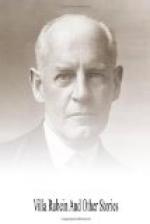III
When at last Swithin reached the Goldene Alp, he found his brother and friend standing uneasily at the door. Traquair, a prematurely dried-up man, with whiskers and a Scotch accent, remarked, “Ye’re airly, man!” Swithin growled something unintelligible, and swung up to bed. He discovered a slight cut on his arm. He was in a savage temper—the elements had conspired to show him things he did not want to see; yet now and then a memory of Rozsi, of her soft palm in his, a sense of having been stroked and flattered, came over him. During breakfast next morning his brother and Traquair announced their intention of moving on. James Forsyte, indeed, remarked that it was no place for a “collector,” since all the “old” shops were in the hands of Jews or very grasping persons—he had discovered this at once. Swithin pushed his cup aside. “You may do what you like,” he said, “I’m staying here.”
James Forsyte replied, tumbling over his own words: “Why! what do you want to stay here for? There’s nothing for you to do here—there’s nothing to see here, unless you go up the Citadel, an’ you won’t do that.”
Swithin growled, “Who says so?” Having gratified his perversity, he felt in a better temper. He had slung his arm in a silk sash, and accounted for it by saying he had slipped. Later he went out and walked on to the bridge. In the brilliant sunshine spires were glistening against the pearly background of the hills; the town had a clean, joyous air. Swithin glanced at the Citadel and thought, ’Looks a strong place! Shouldn’t wonder if it were impregnable!’ And this for some occult reason gave him pleasure. It occurred to him suddenly to go and look for the Hungarian’s house.
About noon, after a hunt of two hours, he was gazing about him blankly, pale with heat, but more obstinate than ever, when a voice above him called, “Mister!” He looked up and saw Rozsi. She was leaning her round chin on her round hand, gazing down at him with her deepset, clever eyes. When Swithin removed his hat, she clapped her hands. Again he had the sense of being admired, caressed. With a careless air, that sat grotesquely on his tall square person, he walked up to the door; both girls stood in the passage. Swithin felt a confused desire to speak in some foreign tongue. “Maam’selles,” he began, “er—bong jour-er, your father—pare, comment?”
“We also speak English,” said the elder girl; “will you come in, please?”
Swithin swallowed a misgiving, and entered. The room had a worn appearance by daylight, as if it had always been the nest of tragic or vivid lives. He sat down, and his eyes said: “I am a stranger, but don’t try to get the better of me, please—that is impossible.” The girls looked at him in silence. Rozsi wore a rather short skirt of black stuff, a white shirt, and across her shoulders an embroidered yoke; her sister was dressed in dark green, with a coral necklace; both girls had their hair in plaits. After a minute Rozsi touched the sleeve of his hurt arm.




